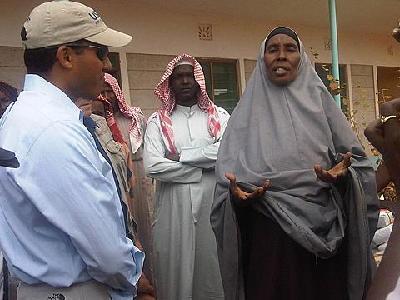With the drought in Somalia officially declared a famine, the administrator of the United States Agency for International Development, USAID, was in the Dadaab refugee camps of Kenya to pledge American support. But will that support meet the needs?

USAID director Rajiv Shah arrived in Kenya Wednesday morning for a day-long visit to the refugee camps surrounding Dadaab, in Kenya's northeast. Dadaab, once a sleepy desert village, now plays host to more than 400,000 refugees, mostly from neighboring Somalia.
The influx of refugees has been near constant since the onset of conflict in Somalia, but has accelerated in recent months due to the extreme drought plaguing much of the region.
Shah visited the Ifo camp Wednesday morning as many refugees,haggard after the long journey from Somalia, stood outside the gate, waiting for relief. After a tour with US Ambassador to Kenya Scott Gration, Shah praised US efforts, particularly through the Famine Early Warning System, in dealing with the food and water shortages.
"Because we have been collecting the data and taking very aggressive actions since about August and September of last year, we believe those efforts have effectively mitigated some of the challenging consequences of the drought." said Shah.
He also pointed to livestock vaccination programs and past World Food Program assistance as evidence of the United States' involvement in the east African crisis.
The United Nations has officially declared what many observers had suspected: the crisis in Somalia has devolved into famine. On the heels of that declaration, Shah told reporters at the Ifo camp that the United States government had pledged an additional $28 million to assist affected people in Somalia as well as recent refugees. The US is already providing $431 million in aid.
But there are questions about whether the extra money will be enough to handle even those in Kenya's camps, let alone the millions outside the camps and in Ethiopia and Somalia. On Wednesday, aid group Oxfam International accused Western governments of "willful neglect," saying barely a quarter of the $800 million needed to combat the famine had been delivered.
Shah told reporters that much of the international effort to mitigate the drought and address the humanitarian crisis had been blocked by the Somali insurgent group al-Shabab.
"It's no accident that the specific geographies that have been declared by the international community as an official famine are those areas where humanitarian actors simply have not been allowed to have access to the population." added Shah.
The famine has been declared for the regions of Lower Shabelle and southern Bakool, two strongholds of the al-Qaida-linked group. In the past al-Shabab has restricted humanitarian access to populations under their control, but recently said they were reversing that position in light of the current crisis.
Shah said the US would "test the willingness" of al-Shabab to allow aid to the affected areas, but would not specify how exactly that willingness would be tested. He told reporters the United Nations was "leading an effort to understand what that means."
After touring the Ifo registration center, Shah visited the camp outskirts where recent arrivals have, over the past few years, made Dadaab the third largest city in Kenya. Many who have just arrived have only been provided with plastic sheets to build their houses due to shortages in the camps. Many have been waiting weeks for official registration and regular food rations, and many will likely wait weeks more.
In the meantime, Somalis are expected to keep pouring across the border, into Kenya's refugee camps at an estimated rate of 1,300 per day.
influx: the fact of a lot of people, money or things arriving somewhere(人、資金或事物的)涌入,流入
haggard: looking very tired because of illness, worry or lack of sleep(由于生病、焦慮或睡眠不足)憔悴的,疲憊的
mitigate: to make something less harmful, serious, etc. 減輕;緩和
Somalia is high on terrorism risk list
Little hope for talks on Somali government transition
As drought intensifies, Kenya fears famine
Oxfam: Somali drought could be as serious as 1992
(來(lái)源:VOA 編輯:實(shí)習(xí)生高美)
